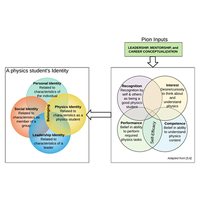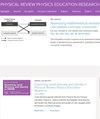导师制、职业概念化和领导力在培养女性物理学认同感和归属感方面的作用
IF 3.6
2区 教育学
Q1 EDUCATION & EDUCATIONAL RESEARCH
Physical Review Physics Education Research
Pub Date : 2024-03-11
DOI:10.1103/physrevphyseducres.20.010114
引用次数: 0
摘要
在美国,获得物理学学士学位的女性比例(25%)远远落后于男性,而且女性离开该专业的比例更高。要实现物理学领域的公平,就意味着女性在物理学领域的留校率要与男性持平,但这需要改变文化和支持结构。强烈的归属感可以提高留校率,因此,旨在提高物理学认同感(兴趣、认可、表现和能力)的干预措施可能会提高总体留校率,并在不同程度上提高女性的留校率。我们描述了我们的模型,在该模型中,导师指导、对职业选择的理解(职业概念化)和领导力是物理认同感这些维度发展的输入因素。本文包括一项定性研究的初步结果,该研究旨在更好地了解职业概念化、领导力和导师指导如何促进物理学认同感和归属感的发展。我们报告了对 15 名物理学本科生的调查结果,并对其中 5 名学生进行了后续访谈。这些学生来自两所院校:一所是美国中西部地区的小型私立文理学院,另一所是美国东南部地区的大型公立大学,被归类为西班牙裔服务院校(HSI)。关于导师制,与现有文献一致,我们发现导师制可以为学生参与物理社区活动提供重要支持。领导经验以前并没有被定位为对身份认同的重要投入,但我们发现,这些经验帮助物理学界的女性更加自信,有助于她们认识到自己是物理人。虽然有关职业概念化如何促进身份认同建立的数据有限,但与认可和能力有一定的联系,这将是未来探索的一个有趣途径。本文章由计算机程序翻译,如有差异,请以英文原文为准。

Role of mentorship, career conceptualization, and leadership in developing women’s physics identity and belonging
The percentage of women receiving bachelor’s degrees in physics (25%) in the U.S. lags well behind that of men, and women leave the major at higher rates. Achieving equity in physics will mean that women stay in physics at the same rates as men, but this will require changes in the culture and support structures. A strong sense of belonging can lead to higher retention rates so interventions meant to increase dimensions of physics identity (interest, recognition, performance, and competence) may increase persistence overall and increase women’s retention differentially. We describe our model in which mentorship, an understanding of career options (career conceptualization), and leadership are inputs into the development of these dimensions of physics identity. This paper includes preliminary results from a qualitative study that aims to better understand how career conceptualization, leadership, and mentorship contribute to the development of physics identity and belonging. We report results from a survey of 15 undergraduate physics students which was followed up by interviews with 5 of those students. The students were from 2 institutions: a small private liberal arts college in the midwest region of the U.S. and a large public university in the southeast region of the U.S. classified as a Hispanic-serving institution (HSI). With respect to mentorship, consistent with the existing literature, we found that it could provide critical support for students’ engagement in the physics community. Leadership experiences have not previously been positioned as an important input into identity, yet we found that they helped women in physics feel more confident, contributing to their recognition of themselves as physics people. While the data on how career conceptualization contributed to the building of identity is limited, there are some connections to recognition and competence, and it will be an interesting avenue of future exploration.
求助全文
通过发布文献求助,成功后即可免费获取论文全文。
去求助
来源期刊

Physical Review Physics Education Research
Social Sciences-Education
CiteScore
5.70
自引率
41.90%
发文量
84
审稿时长
32 weeks
期刊介绍:
PRPER covers all educational levels, from elementary through graduate education. All topics in experimental and theoretical physics education research are accepted, including, but not limited to:
Educational policy
Instructional strategies, and materials development
Research methodology
Epistemology, attitudes, and beliefs
Learning environment
Scientific reasoning and problem solving
Diversity and inclusion
Learning theory
Student participation
Faculty and teacher professional development
 求助内容:
求助内容: 应助结果提醒方式:
应助结果提醒方式:


